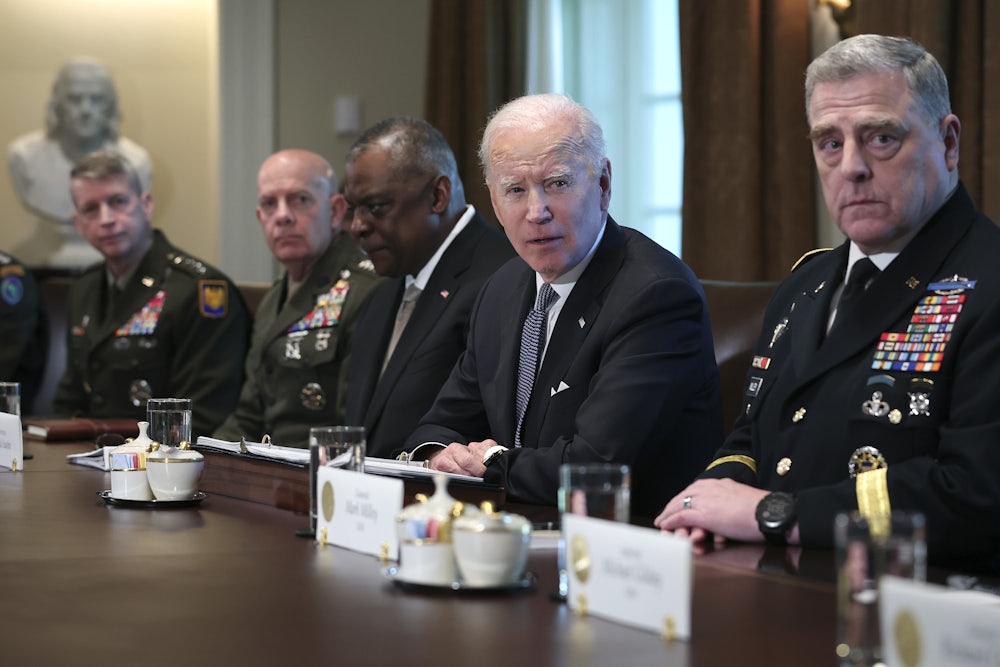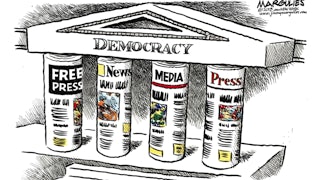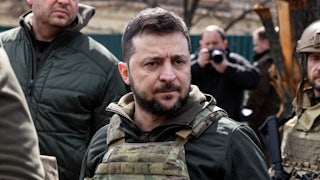It is beguiling to imagine victory parades in Kyiv and other Ukrainian cities as beaten-down Russian soldiers flee across the border with Vladimir Putin’s imperial ambitions in tatters. But despite the bravery of the Ukrainian forces and the righteousness of their cause, the odds remain small that the most devastating European war in more than three-quarters of a century will end in such glorious and unequivocal fashion.
The latest news reports and military analyses predict brutal artillery and tank battles along a 300-mile front in eastern Ukraine. Even with enhanced weaponry (including fighter jets) being sent to Ukraine by the United States and NATO allies, the only certainties are more death and destruction. We may be headed toward a stalemate in which military lines remain roughly static for months in ways reminiscent of World War I.
What happens then? Does the United States ever push for a negotiated settlement? Or do we keep up the flow of lend-lease weapons to Ukraine as long as long as Volodymyr Zelenskiy and his government want to keep waging war? So far that complicated calculation has been infrequently publicly discussed, but it could become the dominant question facing the U.S. and NATO in the coming months as the bloodshed increases. Underlying all these knotty questions is the conundrum of whether America is willing to grant Putin any reward for his morally indefensible war and the war crimes that have gone with it.
Up to now, almost all American discussion of the Ukraine war has been built around short-term thinking as the military realities kept defying expectations. Rather than reveling in a triumphal march into Kyiv, the Russian army demonstrated humiliating ineptitude. Instead of ceding eastern Ukraine to the Russian forces, the Ukrainian military has demonstrated fierce resolve, right down to the beleaguered forces trapped in a sprawling steel plant in Mariupol. Only now, as the Ukraine war hits the eight-week mark, is there an awareness that we are in this fight for the long haul—and that the time for ad-hoc thinking has passed.
Too often, American foreign policy has been governed by abstractions and emotionally loaded words like “appeasement” and “Munich.” In retrospect, it is hard to believe that a specious concept like the domino theory shaped policy debates during the Vietnam War. But the carnage in Ukraine is not an abstract possibility; it’s a harrowing reality. What are the principles that should govern our offstage involvement in a war against Russia that will lead to thousands of additional deaths?
These are questions that are easy to glide over at a time when more than three-quarters of Americans—with no significant difference between political parties—support sending more military aid to Ukraine, according to a late March national poll sponsored by the Chicago Council on Global Affairs. But, ultimately, as Americans grow war weary and emotionally numbed by the horror stories from Ukraine, the Biden administration will have to decide what our ultimate war aims are as Ukraine’s major arms supplier.
The obvious face-saving exit route for Putin is to ratify his de facto control over large segments of the Donbas region that Russia seized in 2014. Of course, there is no guarantee that such a cynical bargain with Putin would be successful. But if the war could be ended along those terms, tens of thousands of Ukrainian lives might well be saved.
There will be those on the right who will inevitably claim that any negotiated settlement in Ukraine would serve as a Joe Biden permission slip for autocrats everywhere. But that is conceptual overreach. The calculations by Chinese leader Xi Jinping about if and when he will try to take over Taiwan have almost no connection to the lumbering failure of Russia’s conscript army in Kyiv or the outcome of the battle for control of the Donbas. And the Iranians have problems enough of their own without looking to Putin for strategic guidance.
The only autocrat who matters in these calculations is Putin himself. Peacekeepers may be blessed, but a strong case can be made that anything less than abject defeat will encourage Putin to open new fronts in his chosen war with the West. If Putin were bought off with the Donbas, at what point would the Russian megalomaniac try again for Kyiv with a better military strategy and hardened troops? Or next time around—having endured NATO economic sanctions—would Putin try to absorb the Baltic states, daring America and its allies to get into a shooting war with a nuclear power?
/ In honor of Earth Day, TNR’s climate coverage is free to registered users until April 29. Start reading now.
Yes, there are risks in premising American policy on potentially unreliable guesses about Putin’s psyche. The myth of Putin as a cynical but rational chess player has been upended by the march of folly in Ukraine. But are we certain that the new image of him as out of touch and constantly lied to by his generals and his underlings is any more accurate?
Still, the quest for total victory in Ukraine is premised on the belief that defeat is the best deterrent. Having forged NATO unity and a surprising degree of economic sacrifice by the Europeans, Putin should be under no illusions that next time will be easier. The Ukraine war is one of those rare times when the morally right course—forcing Russia to retreat from all of Ukraine—is also the approach that appears to make the most strategic sense. There are no certainties in an irrational war seemingly brought on by Putin’s passion to restore the Soviet Union. But America should do everything in its power—short of sending troops—to bring victory parades to Kyiv.






